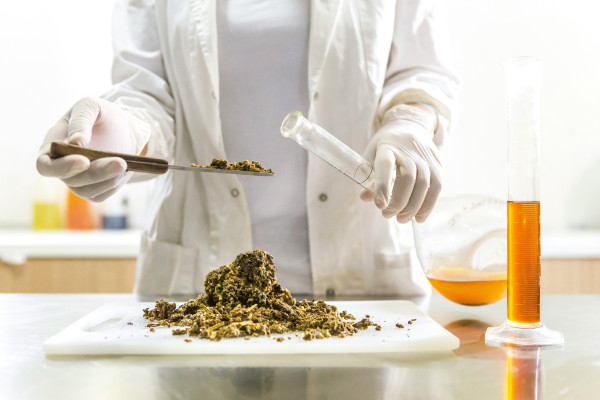
Feeding Pets Like Family Means Formulating Like a Scientist
When it comes to pet nutrition, experience and education matter. Your pet’s health depends on all the people involved in formulating, watching over, and making their food.
Most people likely imagine the formulation of pet food to be as easy as making dinner—throwing your chicken in an oil-coated pan, putting the rice on the stove, and perhaps some broccoli (good choice, by the way) in the oven. However, the science of how nutrients are absorbed, how they impact the genes (no, not jeans) in your body, and subsequently, how they affect your health, are probably not top of mind. Not to mention, like baby formula, pet food has to be complete and balanced, as it is usually the only source of nutrition our pets get.
This means that all of the essential nutrients (amino acids, fatty acids, vitamins, and minerals) are provided. Much like a painting, this is actually just the canvas, the bare bones of health and understanding. And as it turns out, formulating—at least for me—is a work of art; not as generic as making a diet that is “complete-and-balanced,”or a supplement with just anything in it. I try to create masterpieces that not only stand the test of time, but pull from the extensive, very nerdy scientific background to which I spent years dedicating my life. Let’s talk about that scientific quest and dedication to knowledge.

Photo by Bee Naturalles
The Science Behind My Expertise
When I do the math, it turns out that after my four-year college degree, I spent another two years learning about nutrients, absorption mechanisms, and biological functions (to name a few). Then I spent an additional four years researching everything I could about the impact of nutrients on cell structure, bioavailability, gene expression, absorption, blood parameters, nutrient integrations, ionomics, cell cytotoxicity, nutritional biochemistry, growth, signaling, and metabolic pathways, as well as teaching diet formulation. Oh, and lest I forget, how to code for statistics with the statistic majors. Yawn. We are now at 10 years of school, six of which were exclusively focused on studying nutrition. That is longer than law school, vet school, and many other advanced degrees.
Sometimes I think one must have an affection for pain to get a PhD, since so much of life is missed out on, but that is a topic for a different day. Sometimes the quest for figuring out mechanisms is so great that PhDs will dive deeper into seriously advanced topics and go for their post-doctoral work, which is at least another year. Since I couldn’t help but refine my skills by helping to develop a protocol to isolate immune cells out of fat, we can add another year: that makes 11.
My goal is to highlight the years dedicated solely to nutrition, the deep and scientifically rigorous program in which a PhD nutritionist has been trained and practiced. The understanding of nutrients, metabolism and formulation is an all-consuming endeavor for the serious nutritionist. Animal diets demand a comprehensive, specialized, and nuanced understanding of how a diet affects health at a biochemical and physiological level.

Photo by Gayatri Malhotra
What Does This Really Mean?
Not all pet food and supplements are created equal. Many products on the market are developed with minimal scientific backing, relying on outdated formulations or unverified claims. My extensive background ensures that every formulation I create is grounded in evidence-based science, incorporating the latest advancements in animal nutrition. This means:
- Deeper Specialization and Precise Formulation: My education is entirely focused on nutrition, so ingredients are carefully selected for proven benefits, with a 3D understanding of potential interaction and implications within the body.
- Evidence-Based Formulation: I develop pet food and supplements based on carefully vetted, cutting-edge nutritional science.
- Balanced Nutrition: Formulations are designed to be more thoughtful than just “meeting AAFCO standards” or other targets. I take all the ingredients at hand and think about how they work together. Not all casseroles are the same.
- Advanced Research Skills: Staying ahead of emerging trends and always improving formulations are paramount. Extensive research experience inclines me toward critical evaluation of new science that can be applied to product formulation.
- Precision and Innovation: I leverage the latest discoveries in nutritional biochemistry to craft optimal diets for pets, ensuring superior bioavailability and nutritional integrity.
A Commitment to Better Pet Health
As you consider your pet food or supplement options, I would recommend looking for one formulated by PhD nutritionists. If they are anything like myself, they are crazy enough to spend an additional seven years of post-graduate education on their craft, and therefore are wholly dedicated to it.
After all, pets are more than just animals—they’re family. Their health and well-being should never be left to marketers and accountants. When you choose a product formulated by BSM Partners, you’re choosing a team committed to excellence and, above all, passionate about science.
Follow us on LinkedIn for the latest updates on all things happening here at BSM Partners.
About the Author
Dr. Blaire Aldridge is the Vice President of Nutrition Services at BSM Partners. Throughout her career, Dr. Aldridge has been one of the industry’s primary innovators in companion animal nutrition, leading teams at Nestle Purina to groundbreaking products and solutions. She is also an experienced innovator for equine nutrition. Dr. Aldridge received her master’s degree and PhD in monogastric nutrition at Purdue University, and conducted post-doctoral work in human nutrition at Washington University Medical School.
This content is the property of BSM Partners. Reproduction or retransmission or repurposing of any portion of this content is expressly prohibited without the approval of BSM Partners and is governed by the terms and conditions explained here.